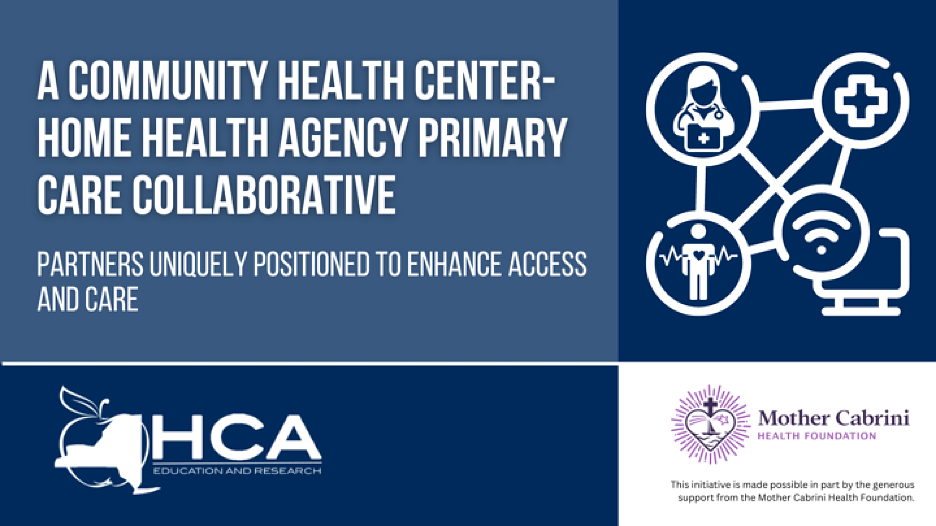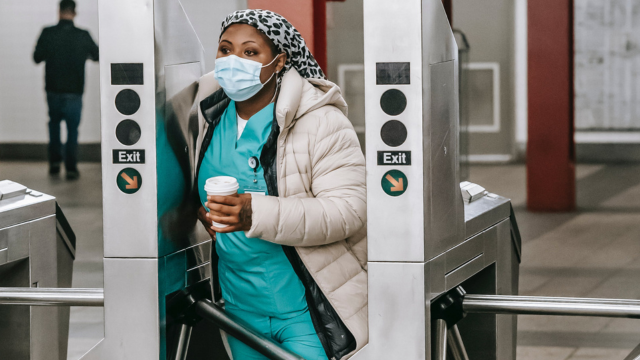
Active Grant
Addressing Health Disparities Through Home Care

About
The Home Care Association of New York State Education & Research (HCA E&R) has been awarded funding from the Mother Cabrini Health Foundation to identify and address health disparities in populations receiving health care in homes and community-based services (HCBS) statewide.
This project includes a spectrum of components, including an assessment of disparities and potential interventions, a statewide diversity and cultural awareness education for all community based care organizations’ staff, a point of service translation pilot, a live-recorded training component for strategies and support for patients who have co-occurring behavioral health and physical health needs, a health literacy component for homebound individuals, a rural primary care collaborative, and engagement in Duke University’s “Population Care Coordinator Program” to train and certify clinicians in population care coordination.
Read more about each component and how you can get involved, below.
Health Literacy
The initiative will pilot test the efficacy of providing virtual health literacy education and information to home care and hospice care recipients through the Virtual Senior Center (VSC), in partnership with Selfhelp Community Services, operator of the VSC. All home care, hospice, MLTC, FI/CDPAP and Waiver Program recipients encouraged to participate.
Health literacy has been defined as “the degree to which individuals have the capacity to obtain, process, and understand basic health information and services needed to make appropriate health decisions.” (Ratzan and Parker, 2000)
Health literacy is key to positive patient experience, outcomes, effective self-care, and partnership with care professionals. It is also critical in breaking through health disparities.
Your participation in this type of initiative will help equip you and your organization for advancement, and most importantly, will support your efforts to promote quality care and patient quality of experience, quality of life, independence and dignity.
Watch this compelling example of a VSC participant:
How to Enroll
The VSC contains an accessible menu of informational and educational material to support health literacy for recipients that can be directly accessed by the individual once they are enrolled. Individuals you identify, and who wish to enroll, will just need your help to be signed into the VSC.
Once enrolled, the individual (solo or with the assistance of their caregiver or family members) can access the elements of health literacy on the VSC. There is no limit to access; recipients can sign-in according to a schedule that works best for them.
There are no requirements other than to enroll, and to agree to provide feedback on the experience and benefit. Participating providers and organizations will be similarly asked to provide feedback and recommendations that HCA and the Mother Cabrini Foundation can use to evaluate and consider long-term support for the program.
At this link, you can enroll your client immediately by creating an account for them. The VSC team will keep HCA apprised (de-identified, no PHI) of the number of enrollees by organization and region.
Assessment of Disparities and Interventions
HCA E&R in conjunction with our project partner, IPRO, led a statewide assessment to explore disparities and interventions that assist with impacting care in HCBS. Read the full report on identified health disparities, corresponding gaps and barriers, and potential interventions here.
As a result of the assessment, respondents requested more information in in various areas. The following webinars were made available to fill the gaps identified from the assessment. The recordings are available on HCA’s LMS via the links below.
Assessing and Addressing Social Determinants of Health by Adopting and Utilizing PREPARE.
This presentation provides an overview of the PRAPARE (Protocol for Responding to & Assessing Patients’ Assets, Risks & Experience) screening tool, implementation and action toolkit, available resources, and reviews PRAPARE codes including ICD- 10 CMS Z codes and others.
Collaborating and Knowing Your Community Partners and Resources
This presentation shares insights on successful partnerships, tips for navigating the challenges of creating new relationships, and reviews a Socioeconomic Risk Assessment tool, and a Community Resource Tool which includes county-level resources.
Best Practices for Collecting and Utilizing Patient Sociodemographic Data
This presentation reviews best practices for collecting and utilizing patient sociodemographic data used to identify and address disparities to ensure equitable care, and the impact of health-related social needs on health outcomes.
Mental Health Training
HCA in partnership with the New York State Office of Mental Health and the Finger Lakes Geriatric Center of the University of Rochester provided special training and educational curriculum for staff of home care agencies, hospice, MLTC and community mental health provider staff to advance the skills and knowledge of staff and the agencies’ organizational practices and strategies for the care and support of patients who have mental health interdisciplinary needs.
Recordings are now available for this specially-developed curriculum to enhance your practice knowledge and skills in the care of individuals with co-occurring physical and mental/behavioral needs; these are the individuals with the most complex, intensive and interdisciplinary needs; those who represent the greatest challenges in care; and those who far too often suffer the cracks of the fragmented physical-and-mental/behavioral health system.
The recordings will be posted on HCA’s new Learning Management System.
A New Tool Available To Help you Understand Delirium, Dementia, and Depression!
The Home Care Association of New York State Education and Research (HCA E&R) was awarded funding from the Mother Cabrini Health Foundation to identify and address health disparities in populations receiving health care in homes and community-based services statewide. HCA E&R in partnership with the Finger Lakes Geriatric Education Center held an educational webinar on December 15th to provide an overview of Dementia, Delirium, and Depression, and introduced a new point-of-care tool to help you better understand the differences between the 3 D’s. Thomas Caprio, MD, Professor of Medicine and Director of the Finger Lakes Geriatric Education Center, provided an overview of the new tool, supplemental information, and a question and answer session. View the webinar here.
For access to the tool, please email
Translation Services
HCA E&R in partnership with Nascentia Health and five pilot agencies is conducting a point-of-care translation services for English language-challenged and non-English speaking individuals in home care. In addition to supporting the care of these individuals, the program will inform potential statewide replication goals.
Through this initiative, HCA and Nascentia Health have translated a number of resources in multiple languages prevalent in NYS. Among the resources are tools for providers and patients including sepsis zone tools, a general health booklet, and a tool differentiating between dementia, delirium, and depression. View the documents in HCA’s upcoming resource library.
Population Care Coordination
HCA has engaged Duke University’s “Population Care Coordinator Program” to train and certify clinicians in population care coordination focused at the community, organizational and patient level. This initiative is currently piloted in 10 agencies across NYS serving as the basis for evaluation and potential expansion for broader availability.
Twenty two clinicians across NYS were engaged and certified upon completion of this training program.

Community Health Center
Our latest project is the Rural Primary Care Collaborative. It is a rural primary care program, under an FQHC-Home Health Agency collaborative, providing primary care access and intervention for individuals who do not, or have difficulty, accessing primary care in a clinic or other office-based environment.



